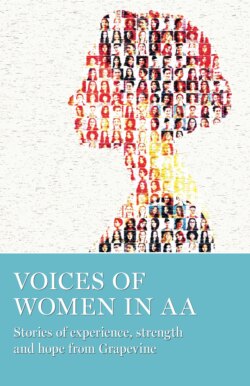Читать книгу Voices of Women in AA - Группа авторов - Страница 11
На сайте Литреса книга снята с продажи.
What We Were Like (Henrietta Seiberling)
Fragments of AA History
ОглавлениеJune 1991 [Excerpt]
The following is an excerpt from an article written by Bill W. in the January 1951 Grapevine. It describes Bill’s call to Henrietta Seiberling, daughter-in-law of the founder of Goodyear Tire Company. It was she who put him in touch with Dr. Bob that fateful day in May of 1935, which led to the founding of Alcoholics Anonymous.
–The Editors
It was a Saturday in May 1935. An ill-starred business venture had brought me to Akron where it immediately collapsed, leaving me in a precarious state of sobriety. That afternoon I paced the lobby of Akron’s Mayflower Hotel. As I peered at the gathering crowd in the bar, I became desperately frightened of a slip. It was the first severe temptation since my New York friend had laid before me what were to become the basic principles of AA, in November 1934. For the next six months I had felt utterly secure in my sobriety. But now there was no security; I felt alone, helpless. In the months before I had worked hard with other alcoholics. Or, rather, I had preached at them in a somewhat cocksure fashion. In my false assurance I felt I couldn’t fall. But this time it was different. Something had to be done at once.
Glancing at a church directory at the far end of the lobby, I selected the name of a clergyman at random. Over the phone I told him of my need to work with another alcoholic. Though I’d had no previous success with any of them I suddenly realized how such work had kept me free from desire. The clergyman gave me a list of ten names. Some of these people, he was sure, would refer me a case in need of help. Almost running to my room, I seized the phone. But my enthusiasm soon ebbed. Not a person in the first nine called could, or would, suggest anything to meet my urgency. One uncalled name still stood at the head of my list—Henrietta Seiberling. Somehow I couldn’t muster courage to lift the phone. But after one more look into the bar downstairs something said to me, “You’d better.” To my astonishment a warm Southern voice floated in over the wire. Declaring herself no alcoholic, Henrietta nonetheless insisted that she understood. Would I come to her home at once?
Because she had been enabled to face and transcend other calamities, she certainly did understand mine. She was to become a vital link to those fantastic events which were presently to gather around the birth and development of our AA Society. Of all names the obliging rector had given me, she was the only one who cared enough. I would here like to record our timeless gratitude.
Straightaway, she pictured the plight of Dr. Bob and Anne. Suiting action to her word, she called their house. As Anne answered, Henrietta described me as a sobered alcoholic from New York who, she felt sure, could help Bob. The good doctor had seemingly exhausted all medical and spiritual remedies for his condition. Then Anne replied, “What you say, Henrietta, is terribly interesting. But I am afraid we can’t do anything now. Being Mother’s Day, my dear boy has just brought in a fine potted plant. The pot is on the table but, alas, Bob is on the floor. Could we try to make it tomorrow?” Henrietta instantly issued a dinner invitation for the following day.
At five o’clock next afternoon, Anne and Dr. Bob stood at Henrietta’s door. She discreetly whisked Bob and me off to the library. His words were, “Mighty glad to meet you, Bill. But it happens I can’t stay long; five or ten minutes at the outside.” I laughed and observed, “Guess you’re pretty thirsty, aren’t you?” His rejoinder was, “Well, maybe you do understand this drinking business after all.” So began a talk which lasted hours.
